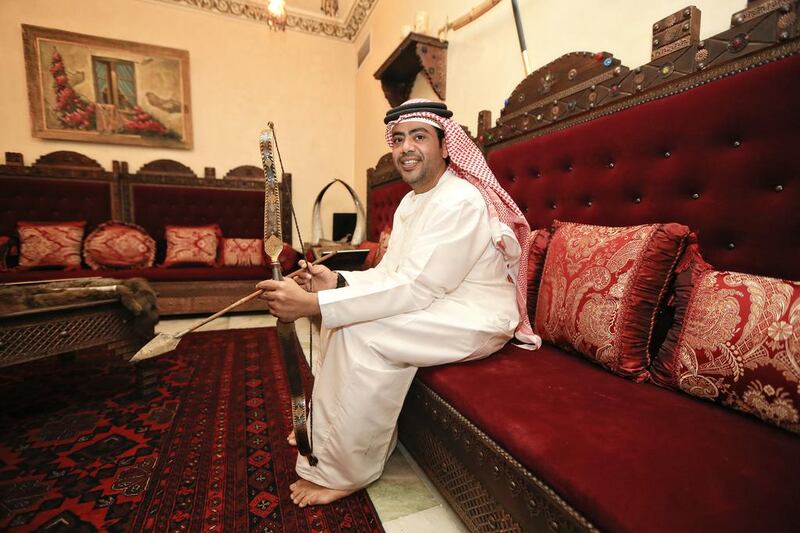ABU DHABI // From ancient manuscripts to Ottoman Kaaba covers, ancient weapons to kangaroo skins, Emirati collector Salah Al Junaibi has an extraordinary collection in his private home museum.
The 38-year-old entrepreneur juggles several roles in his daily life. When he is not collecting various antiques and historical items, or running a string of Emirati and Chinese restaurants, he keeps himself busy as the head of external communication at the Abu Dhabi Judicial Department.
To enter his majlis is to visit different eras and civilisations.
In one corner lies a Quran so unusual it is impossible to guess what it is on first sight. Inside a big, book-shaped box, there are 144 small precious stones.
“Each stone has a chapter of the Quran engraved on it,” says Mr Al Junaibi as he holds a magnifying glass against one of the stones.
It is a unique item from the early 20th century and sold at auction for US$20,000 (Dh73,000).
Elsewhere there is a 3 metre by 2 metre silk blanket, which has the Quranic verses and the names of Allah and the Prophet stitched into it in silver and gold threads. It was used to cover the inner walls of the Kaaba in Mecca during the Ottoman era. He cannot recall exactly what he paid for the blanket, but thinks it was about $200,000.
He also has a slightly smaller blanket, both of which he bought from a Saudi merchant and regards as irreplaceable. “Once I got a good deal to sell them but my wife said no,” he says.
His wife Amal, 33, says: “I told him to sell anything except the covers for the Kaaba because you will never find anything like them again.”
Similarly intriguing is a large piece of fancy green silk fabric, which is draped elegantly over the couch, that he says “used to be on prophet Mohammed’s grave”.
In the far left corner of the majlis is a stainless steel suit of armour.
The armour dates from the late 19th century and has Quran verses engraved on it with gold inlays. The armour cost $30,000.
There are many other items – precious stones, a candlestick from the Seljuk era, a Mamluk pot, old Andalusian and Kufi Qurans, and weapons, such as swords made of Damascus metal and wooden bows and arrows.
There is even a kangaroo skin from Australia.
Asked how many items he has, Mr Al Junaibi takes a long breath and replies: “Countless.”
He began his collection as soon as he graduated from university in 1999 and it has proved both a costly and risky hobby.
“I was scammed a few times,” he says. “But it was my fault because I refused to take a second opinion.”
He says there are three ways of finding out whether an item is authentic – the “amateur eye, the expert eye and the laboratory test”. That final test is the most sophisticated.
“In general I can tell from the calligraphy of the text, the type of paper, ink and alleged era,” he says.
“For instance, if a text claims to be from the Kufi era but the letters have dots, it is not authentic because they did not use dots back then.”
His hobby can be profitable too, during times of high demand.
Before the inauguration of an Islamic museum in the Arabian Gulf he was able to sell for $36,000 a collection of coins he bought for $5,000.
Mr Al Junaibi has inherited a love of travel and collecting from his late father, who was an ambassador in Pakistan and New York.
He has visited most of Europe, the US, Latin America, Africa and the Far East.
“I told my wife when we got married, ‘I will travel with you around the world to see its wonders’,” he says.
As he is talking, his eldest son Khamees, 12, comes running from upstairs holding his own collection of special-issue UAE coins.
“This is the first time I’ve seen it,” his father says proudly.
But collecting old items is just part of his life and travels. Sometimes he takes a break to find new concepts for his traditional restaurants.
He already has three Emirati and three Chinese restaurants, but he is planning a 1960s themed restaurant and a moveable coffee saloon that he says will be launched soon.
hdajani@thenational.ae
Biography
Name: Salah Al Junaibi
Age: 38
Address: Abu Dhabi
Job: Head of external communications at the Abu Dhabi Judicial Department, a collector of historical and antique items, owner of several restaurants and hypermarkets.
Family: Wife, Amal Al Junaibi, 33, and children, two boys, 12 and 8, and three girls, 18-month-old twins and 5-month-old baby
Qualifications: Bachelor’s degree from Colorado State University, Master’s degree in international relations from Lahaye International University, and now doing a doctorate in international relations at Lahaye International University.







